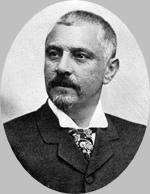Júlio Prates de Castilhos
| Júlio de Castilhos | |
|---|---|
 | |
| Governor of Rio Grande do Sul | |
|
In office 25 January 1893 – 25 January 1898 | |
| Preceded by | Fernando Abbott |
| Succeeded by | Borges de Medeiros |
|
In office 15 July 1891 – 12 November 1891 | |
| Preceded by | Fernando Abbott |
| Succeeded by | Governing Junta |
| Personal details | |
| Born |
June 29, 1860 São Martinho, district of Cruz Alta (now Júlio de Castilhos), Empire of Brazil |
| Died |
October 24, 1903 (aged 43) Porto Alegre, Brazil |
| Political party | PRR |
| Profession | lawyer |
Júlio Prates de Castilhos (Cruz Alta, 29 June 1860 — Porto Alegre, 24 October 1903) was a Brazilian journalist and politician. Elected Patriarch of Rio Grande do Sul.[1]
He was twice the governor of Rio Grande do Sul and was the principal author of the State Constitution of 1891 and a model for many future politicians of the region.[2] He disseminated positivist ideas in Brazil.
On July 15, 1891, Julio de Castilhos was elected president of the state of Rio Grande do Sul However, with the fall of Deodoro da Fonseca, was deposed on November 3 that year.[1]
The town of Júlio de Castilhos, where he was born, is named after him.
References
- 1 2 "Júlio Prates de Castilhos" (in Portuguese). UOL - Educação. Retrieved 22 October 2012.
- ↑ Margaret Bakos, Júlio de Castilhos: Positivismo, abolição e república (EDIPUCRS, 2006: ISBN 85-7430-601-0), p. 9.
External links
![]() Media related to Júlio Prates de Castilhos at Wikimedia Commons
Media related to Júlio Prates de Castilhos at Wikimedia Commons
This article is issued from
Wikipedia.
The text is licensed under Creative Commons - Attribution - Sharealike.
Additional terms may apply for the media files.